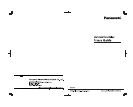
4
Use of contact protective devices or protection circuits can suppress the counter emf to a low level.
However, note that incorrect use will result in an adverse effect. Typical contact protection circuits are
given in the table below.
Also, note that release time will slow down due to sneak in the circuit and may cause the electrical life to
shorten and slight-welding.
Diode circuit
Circuit
Features/Others
The diode connected in parallel causes the energy stored in the coil
to flow to the coil in the form of current and dissipates it as joule
heat at the resistance component of the inductive load. This circuit
delays the release time. (2 to 5 times the release time listed in the
catalog)
Devices Selection
Use a diode with a reverse breakdown voltage at least 10 times the
circuit voltage and a forward current at least as large as the load
current or larger.
In electronic circuits where the circuit voltages are not so high, a
diode can be used with a reverse breakdown voltage of about 2 to 3
times the power supply voltage.
Diode and zener diode circuit
Circuit
Features/Others It is effective in the diode circuit when the release time is too long.
Devices Selection
Use a zener diode with a zener voltage about the same as the power
supply voltage
In the actual circuit, it is necessary to mount the protective device (diode etc.) in the immediate vicinity of
the load. If it is mounted too far away, the effectiveness of the protective device may diminish. As a guide,
the distance should be within 50cm.
4. Load,
electrical life
22. Contact
protective
circuit
Avoid using the protection circuits shown in the figures below.
Although it is usually more difficult to switch with DC inductive loads compared to resistive loads, use of
the proper protection circuit will raise the characteristics to that for resistive loads.
Although it is extremely effective in arc
suppression as the contacts open, the
contacts are susceptible to welding since
energy is stored in C when the contacts open
and discharge current flows from C when the
contacts close.
Although it is extremely effective in arc
suppression as the contacts open, the
contacts are susceptible to welding since
charging current flows to C when the
contacts close.


















